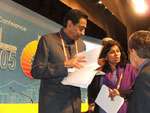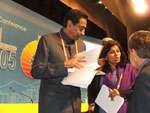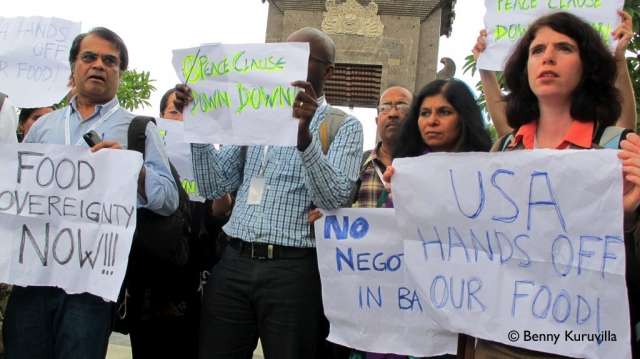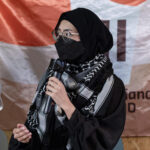
“There is nothing in this disastrous text for India and the other developing countries. The consequences of it are irreversible and this minority government, which Mr Nath represents, does not have the political or moral mandate to sign away our rights forever. That is why we are giving him this urgent message in Hong Kong,” said Shalmali Guttal of Focus on the Global South. More than 90 Indian groups endorsed the letter.
Call to Indian Commerce Minister Kamal Nath to reject Annex C on GATS
Before you arrived at Hong Kong, 115 Indian groups representing Trade Unions, social movements and NGOs sent an open letter to over 450 Members of the Indian Parliament (MPs) questioning the minority governments mandate in the GATS talks. As a result, questions were raised in the Indian Parliament by several MPs on your delegation’s negotiating strategy that compromises India’s public interests as well as alienates its long established allies.
Annex C has several problems. The principal one is that it changes the rules in the midst of the game. Developing countries agreed to the GATS because of its flexible nature and this text contains language that completely reverses this mechanism. We do not understand how far-reaching plurilateral and sectoral negotiations can be launched when countries are nowhere near agreement on multilateral rules on crucial areas such as Emergency Safeguard Mechanisms, Subsidies and Domestic regulation. Reports indicate that sectors such as finance, telecommunications, energy, distribution, water, education and health will be particularly targeted in sectoral negotiations in 2006. Further, the language in the modal section (Paragraph 1), which was mainly drafted by India, will be used by countries with export interests to demand mandatory qualitative and quantitative targets for services liberalisation. Also questionable are India’s purported gains in Mode 4, which are concentrated on an elite section of professionals. We also understand that the US Congress will not provide USTR Robert Portman with the mandate to link temporary movement of labour into trade agreements such as the GATS. Finally the text mentions that countries should look at a possible framework for liberalising government procurement, an issue that was rejected by virtually the entire developing country membership as part of the Singapore issues in the 2003 Cancun Ministerial.
There is nothing in this disastrous text for India and other developing countries. We urge you to reject this text unconditionally and join hands with other developing countries that are calling for the same. India has been in the forefront of defending third world interests in the WTO and this Ministerial Conference offers you an opportunity to stand up for the South.
Signed by Indian groups in Hong Kong
1. Andhra Pradesh Vyavasaya Vruthidarula Union
2. Bharatiya Kisan Union, New Delhi
3. Bharat Krishak Samaj, New Delhi
4. Diverse Women for Diversity, New Delhi
5. Equations, Bangalore
6. Focus on the Global South, Mumbai
7. Greenpeace, India
8. Indian Social Action Forum (INSAF)
9. Kalpavriksh, Pune
10. Karnataka Rajya Ryota Sangha, Karnataka
11. Kisan Sangharsh Samiti, Madhya Pradesh
12. Navdhanya, New Delhi
13. Network of Entrepreneurship and Economic Development, Rajastan
14. Peoples Caravan, India
15. Research Foundation for Science Technology and Ecology, New Delhi
16. South Asian Network for Social and Agricultural Development, India
17. Swadeshi Jagran Manch
18. Young Professionals Collective, Mumbai
19. World Dignity Forum, India
Signed by groups from India
20. Air Corporation Employees Union.
21. Akshara
22. All India Bank Employees Association
23. All India Federation of Electricity Employees
24. All India Insurance Employees Association, Mumbai
25. All India LIC Employees Federation
26. All India Peoples’ Science Movement
27. All India Port and Dock Workers Federation (Workers),
28. All India Trade Union Congress
29. Andhra Pradesh Coalition in Defence of Diversity, Hyderabad, AP
30. AP Coalition in Defence of Diversity, Hyderabad, AP
31. All partners under Grassroots Reachout & Networking in India on Trade & Economics (GRANITE) Project which is being implemented by CUTS Centre for Trade, Environment and Economics (CUTS CITEE), India
32. Asia South Pacific Bureau for Adult Education
33. BUILD, Mumbai
34. Centre of Indian Trade Unions
35. Coalition for Nuclear Disarmament and Peace (CNDP)
36. Combat Law
37. Corporate Accountability Desk, Chennai
38. Crynet Collective, Vishakhapatnam
39. CUTS Centre for Consumer Action, Research and Training (CUTS CART), Rajasthan
40. Deccan Development Society, Andhra Pradesh
41. Delhi Forum, Delhi
42. Democratic Youth Federation of India
43. Documentation Research and Training Centre,
44. ECONET, Maharastra
45. Environment Support Group, Bangalore
46. Explorations, Mumbai
47. Fisher Movements Coordination of Tamilnadu & Pondicherry
48. Forum for Biotechnology and Food Security, Delhi
49. Girangaon Rojgar Hakk Samiti
50. Girni Kamgar Sangharsh Samiti
51. Grassroots Reach out & Networking in India on Trade & Economics (GRANITE) Project
52. Hazards Centre
53. Hind Mazdoor Sabha
54. Human Rights Tamilnadu Initiative
55. Human Rights Law Network, Delhi
56. India Centre for Human Rights and the Law,
57. Indian Federation of Trade Unions, Maharashtra
58. Initiative, Mumbai
59. Institute for Community Organisation Research
60. Intercultural Resources
61. IT for Change, Bangalore
62. Kriti, New Delhi
63. Lokayan
64. Lokraj Sanghatan, Maharashtra.
65. Maati Women’s Collective, Uttaranchal, India
66. Maharashtra State Government Employees Confederation,
67. Majlis
68. Manthan Adhyayan Kendra, Badwani
69. Media for People
70. Mines, minerals & PEOPLE, India
71. Movement for Peace and Justice, Maharashtra
72. National Campaign for Dalit Human Rights (NCDHR)
73. National Federation of Postal Employees.
74. National Railway Mazdoor Union.
75. National Union of Seafarers of India
76. Nivara Hakk Saurakshan Samiti
77. New Trade Union Initiative
78. Pakistan India Peoples Forum for Peace and Democracy (PIPFPD)
79. Peoples Media Initiative
80. Samata – Andhra Pradesh
81. Sarva Sharmik Sangh, Maharashtra.
82. Sarva Shramik Sanghatana, Maharashtra
83. Shetkari Sanghatana,
84. Society for Sustainable Development, Karauli
85. South Asia Network for Food, Ecology & Culture, AP India,
86. South Asia Network on Dams, Rivers & People
87. Students Federation of India
88. The Other Media
89. Theckedari Padhati Virodhi Manch, Mumbai.
90. Trade Unions Joint Action Committee, Mumbai – Maharashtra
91. United Artists Association, Orissa
92. Veeranganai Womens Forum
93. Vikas Adhyan Kendra (VAK)
94. Vikas Sahyog Pratishtan, Maharashtra
95. Water Watch, New Delhi
96. YUVA








